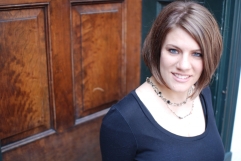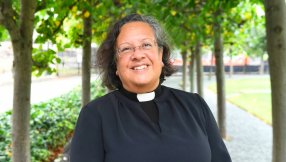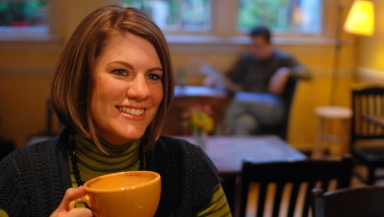
"So God created human beings in his own image, in the image of God he created them; male and female he created them." And so begins the Bible.
This verse, taken from the first chapter of Genesis, is – at least in the NIV translation – the first instance in which God is given a gendered pronoun; referred to as 'he', it sets the precedent for the rest of scripture, and yet thousands of years after it was first written the debate over the male/female dichotomy continues.
God is generally referred to as male, justified by images of him as Father and Jesus as Son, though some argue that by solely using male pronouns we undermine the value of those verses that refer to him using female imagery; a mother hen (Matthew 23:37), a nursing mother (Isaiah 49:15), and a woman looking for a lost coin (Luke 15:8-10) to name but a few examples.
To many it is surprising that Christians are still arguing over 2,000 years after Paul declared, "There is neither Jew nor Gentile, neither slave nor free, neither male nor female, for you are all one in Christ Jesus", and it certainly raises interesting questions about our understanding of gender and its significance.
US feminist blogger Rachel Held Evans was probably not, therefore, expecting the backlash she has recently received following the revival of a blog post from 2012 in which she refers to God as "Herself".
Writing about the pain suffered by Mary at the crucifixion, Evans notes that it is here that "Jesus understood the suffering of mothers, perhaps the most powerful suffering of all".
"Mary was not the first, nor the last, mother to hold the broken body of her child in her arms. She was not the first, nor the last, to weep in the company of mothers as they stumbled their way to an open grave," Evans writes.
"It happens every day – when famine claims another little life, when the sudden arrival of blood represents the end of a pregnancy, when cancer strikes yet again, when the phone rings and the news is bad.
"It is a pain that pierces the heart. And, because of today, because of the cross, it is a pain that God Herself understands."
Two years after this blog was first posted, Owen Strachan, the President of the Council on Biblical Manhood and Womanhood – which holds to a traditional reading of male and female roles – condemned Evans' words, tweeting:
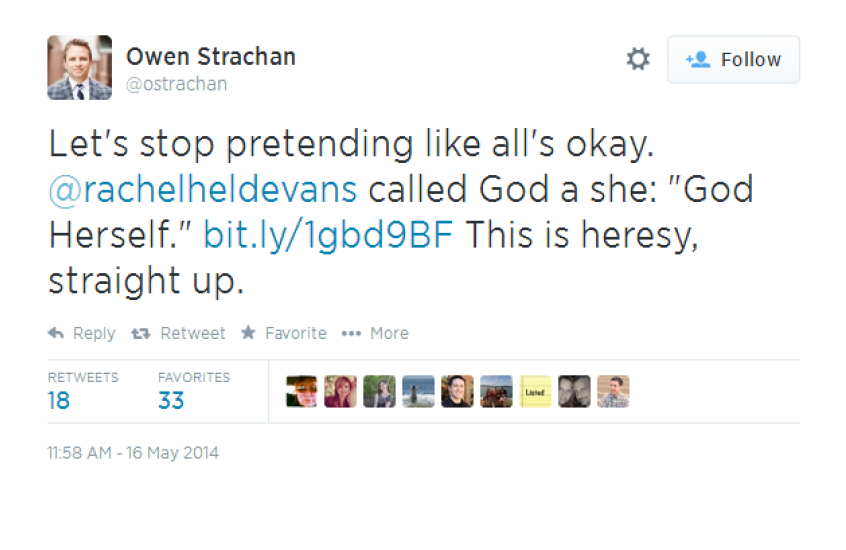
Evans has received a significant amount of criticism for her "liberal" views in the past; her objection to World Vision's reversed stance on employees entering into same-sex marriage resulted in a denunciation from the Conservative right.
"Right when I felt most vulnerable, Christians delivered some swift and focused kicks to my gut. I was publicly mocked and shamed. People called me a heretic and bid me farewell. They took to Twitter to make fun of my appearance and belittle my husband. They called me a 'wolf in sheep's clothing', 'unstable', and 'anti-Christ'," she shared on her website, where she has expressed a desire "to prepare tables in the wilderness, where everyone is welcome and where we can go on discussing (and debating!) the Bible, science, sexuality, gender, racial reconciliation, justice, church, and faith, but without labels, [and] without wars".
Similarly, in response to Strachan's accusation, Evans immediately defended herself and posted a follow-up blog in which she explains her word choice and argues that it's important to open up dialogue rather than immediately brand certain strands of conversation as heretical.
"I disagree with Owen that differences in theology regarding gender are matters of orthodoxy, particularly given the number of faithful Christians who have disagreed on these issues through the centuries, and I'm disappointed he resorted to charges of heresy when we should be able to discuss these differences with gentleness and respect," she shared.
"I believe Scripture teaches that both men and women are created in the image of God (Genesis 1:27), which means both masculinity and femininity are – at some level – part of God's nature.
"The self-naming of God in Scripture is "I AM WHO I AM" – a name without gender... I believe that when we declare God to be exclusively male, we flirt with idolatry, for we re-create God in a human image."
Evans concludes: "On the very rare occasion that I refer to God as She, I do it with a lot of intentionality and with the goal of reminding myself and my readers that God is not merely some elevated, deified version of ourselves. God is not a man. God is not white. God is not American."
This has opened debate one again about our grasp of gender and indeed our understanding of God him (or her) self. Is there really any difference between the use of 'he' or 'she'? And what does it reveal about our vision, or our version, of the Trinity?

Philosopher, sociologist and theologian Elaine Storkey, co-author of Conversations of Christian Feminism, says that by limiting ourselves to male-only language, we restrict our capacity to see God in all his fullness.
"I would simply say that God is always bigger than our language, and the Bible itself gives us permission to address God using many metaphors," she tells Christian Today.
"Some of the metaphors are inevitably gendered, but any single one only ever gives us a glimpse of the breadth and majesty of God. Insisting on all-male metaphors is not only seriously limiting our understanding of God, it repudiates biblical practice.
"And why do it?" she continues. "Because feminine concepts seem repugnant? Why? Of course, we want to avoid any suggestion that we are worshipping a 'goddess' – which is why I personally don't ever refer to God simply as 'she'. But I do draw on the feminine images for God that are already given in Scripture."
Storkey draws attention to God as "implicitly both 'father and mother' (with a womb) in Job 38:28-29" and concludes by noting that she "rarely refer[s] to God as 'He or 'Him' if there is an easy alternative – especially when I am speaking to people outside the church who are particularly conscious of gendered language. 'Godself' is now perfectly understandable."
Theologian and writer Vicky Beeching agrees, adding that it's important to contextualise scripture and take into account the culture in which it was written. "Although we need to respect the Bible, we have to remember it was written by humans in a human context – largely by men in a very patriarchal society – and then even the aspects of which books made it into the canon were approved by councils made up of men. So when we look at it through that lens it can skew how God is represented," she says.
"I say that not to detract from the sacredness of scripture, but to put it in its historical context."
Beeching continues: "I think it's really interesting that in Genesis it says that male and female were both made in God's image. I always come back to that – surely only when we realise the maleness and femaleness within the Godhead do we truly see him for who he is?
"The motherhood aspect of God is really important; his heart of tenderness, nurture and care, and we lose a lot if we don't work that into who God is."
Like Evans and Storkey, Beeching contends that by defining God as masculine, or male, we restrict the expression of God in his fullness. "For many people, using male only pronouns is very unhelpful," she notes.
"Seeing God only as masculine is very limiting, and I think it's good to stir people up to think about God by using feminine pronouns. I'd probably only do it in certain contexts, and I'd explain why I was doing it, but even the fact that using feminine pronouns for God creates such a shockwave in most churches shows we have a long way to go."
She finishes: "I think the more we can do to remind ourselves that God is not biologically male, the better. The Bible has been used throughout history to repress woman – you only need to look at people like Augustine and the kinds of things he said about women being second class citizens – and it's not helped when God is presented as a man. It's not something he's done; it's our extrapolation and our understanding."
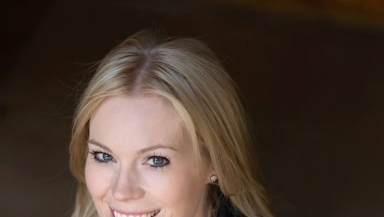
The wave of criticism that Evans has received as a result of her musings is something Beeching is no stranger to. She has been known to retweet some of the offensive messages she receives on social media, and has blogged about the downside to opening up about her views online.
In the wake of expressing her support of same-sex marriage, Beeching disclosed, "My inbox has been overwhelmed with angry messages. I'm now daily called a 'heretic', a 'false prophet', 'a massive disappointment to the evangelical church' and many other names too inappropriate to print".
She told Christian Today that this is symptomatic of a Christian culture that is afraid to wrestle openly with some of the more divisive issues.
"There seems to be a wave of backlash on the internet for bloggers and writers who want to help people think outside the box in some way. There's this orthodoxy lockdown in quite an aggressive and unpleasant way," she shared.
"It's important that we're able to imagine, experiment, dream and discuss without the theology police clamping down."
As for the controversy surrounding Evans and Strachan, Beeching added:"It's great to argue about doctrine and make sure we're on the right path, but I think our perspective of God is continually evolving, and we need to be free to hear his voice on that".













